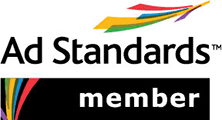Transit Advertising Acceptance Policy
Advertising Acceptance Policy
Is your advertisement truthful, fair, and accurate?
Metrobus has established criteria for the acceptability of advertising on Metrobus property (vehicles, real property, transit shelters, platform video screens and any other "available space" identified), and the process by which the advertising will be reviewed. All advertising on Metrobus property must:
Comply with applicable laws, including but not limited to the Canadian Code of Advertising Standards and the Newfoundland Human Rights Act;
Not discredit the business or service of public transit, Metrobus or its employees or have an adverse affect on the image Metrobus or public transit, as a safe and reliable form of transportation.
Metrobus staff will review the advertising to determine if the advertisements meet the criteria noted above. If the ads do not meet the criteria, the advertisements will not be posted on Metrobus property.
Customers wishing to complain about an advertisement on Metrobus property must contact Advertising Standards Canada. Advertising Standards Canada is the national not-for-profit advertising self-regulatory body. They are committed to fostering community confidence in advertising and to ensuring the integrity and viability of advertising in Canada through responsible industry self-regulation.
Created by the advertising industry in 1957, Advertising Standards Canada was founded on the belief that advertising self-regulation best serves the interests of the industry and the public. This principle has guided their work and activities on behalf of members, the public and the industry for over 50 years.
Advertising Standards Canada

Metrobus is a member in good standing of Advertising Standards Canada (ASC). ASC is a national, advertising self-regulatory body.
1.0 PURPOSE
To establish the criteria for the acceptability of Advertisements for posting on Metrobus Property and the process by which advertisements will be reviewed and accepted.
2.0 OBJECTIVE
The Canadian Charter of Rights and Freedoms (the "Charter") guarantees everyone the rights and freedoms set out therein, including the right to freedom of expression. In a 2009 court decision, the Supreme Court of Canada ruled that a public transit agency (like Metrobus) is subject to the Charter in its role as the host of advertising. If Metrobus chooses to accept advertising on Metrobus property, it must not limit the expression of an Advertiser by refusing an advertisement except as permitted under Section 1 and/or 2(b) of the Charter, as applicable.
The limitations on the content of an advertisement set out in this policy must be viewed in the context of Metrobus' limited legal ability to deny an advertisement under the Charter, as outlined above, while also ensuring that it continues to provide a safe and welcoming public transit system.
This policy sets out the decision making process and responsibility with respect to the acceptability and removal of advertisements on Metrobus property. The St. John's Transportation Commission reserves the right to review any advertisement to determine whether it complies with the requirements as set out in this policy.
3.0 PROCESS FOR ADVERTISEMENT POSTING ON METROBUS PROPERTY
The Advertiser is to deal directly with Metrobus.
Metrobus is responsible for interpreting and implementing this policy. Metrobus shall accept and post any advertisement that meets the guidelines for acceptance in accordance with this policy.
Any advertisement with reference to public transit and/or Metrobus must be presented by the Advertiser to Metrobus for review and acceptance prior to the production of the Advertisement.
4.0 REVIEW
Metrobus shall review the Advertisement and determine whether the Advertisement complies with the guidelines for acceptance under this policy. If Metrobus staff determines that the Advertisement does not comply with the guidelines for acceptance under this policy, the Advertisement shall not be permitted to be posted on Metrobus Property and Metrobus shall advise the Advertiser accordingly.
5.0 COMPLAINTS
A person wishing to make a complaint about an Advertisement posted on Metrobus Property may file the complaint with ASC at www.adstandards.com. Should Metrobus receive a complaint of an Advertisement posted on Metrobus Property, Metrobus shall direct the complainant to file the complaint with ASC at www.adstandards.com.
In the event that ASC determines that a complaint is not within its mandate to investigate, the complaint shall be referred to Metrobus for review to determine whether the Advertisement at issue complies with the Guidelines for Acceptance as set out in Section 6 of this policy.
Metrobus shall have the right to reject or remove any Advertisement from Metrobus Property at no cost to Metrobus.
6.0 GUIDELINES FOR ACCEPTANCE
Any Advertisement must meet all of the following:
Comply with Applicable Laws.
Comply with the ASC Code.
Comply with any rule, procedure, by-law or code of any professional regulatory body.
Comply with the Objective as set out in Section 2 of this policy.
Not discredit the business or service of public transit, Metrobus or its employees, nor have an adverse effect on the image Metrobus, or public transit, as a safe and reliable form of transportation.
QR coded links must include a legible label, above or below the QR graphic, that matches the end URL. A URL where the consumer must choose from two or more additional URLs is not acceptable.
The Advertiser is responsible to satisfy itself that the Advertisement complies with Applicable Laws.
As part of any review or complaint, Metrobus or ASC, as applicable, may consider information contained in the Advertisement including logos, website addresses and referenced websites, the content of the website addresses and the referenced websites, and the background and history of the Advertiser and any other entity referenced in the Advertisement.
6.1 Advocacy/Social Issue/Political Message Advertising
Section 6.1 sets out additional criteria that must be met along with those outlined in section 6.0 when the content of an Advertisement is deemed to be a social issue or political message. Specifically,the ad must identify who the advertiser is and we may require that the advertiser provide "Authorized and Paid for by" disclaimers, appearing legibly, within the content of the advertisment, in cases where the advertiser cannot be clearly identified.
Social issues are sensitive topics that are heavily debated, may influence the outcome of an election or result in/relate to existing or proposed legislation. We require increased authenticity, transparency and clarity to run social issue ads that seek to influence public opinion through discussion, debate or advocacy for or against important topics, like Health and Civil and Social Rights. These ads can come from a range of advertisers. They include activists, brands, non-profit groups and political organizations, who may be required to provide "Authorized and Paid for by" disclaimers on ads that take a stand on issues within our policy.
It is important to note that when advocacy or other issue advertising is considered under the Canadian Code of Advertising Standards (the Code), Standards Councils and Appeal Panels are instructed not to evaluate the advertising based on their personal views of the subject. The Code does not prohibit or restrict any particular position or argument, provided that in communicating its message the ad complies with the standards of truthful, fair, and accurate advertising prescribed under the Code.
 home
home rates
rates specs
specs clients
clients contact
contact






